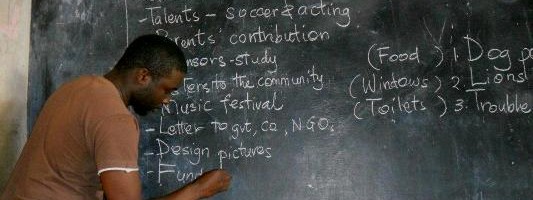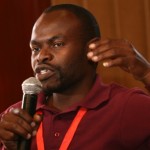Gilbert Mitullah Omware is a 25 year old lawyer, born and bred in Nairobi, Kenya. ” I am passionate about Education and Africa, subjects I simply cannot stop reading on and talking about. I tend to find myself in leadership a lot, whether I wrench it from the arms of other would be contenders, or it is given to me is debatable. I am a dreamer too, and my head is always full of ideas that I would like to make happen.”
When and how did African Solutions for Africa Programme (ASAP) come about?
ASAP started as a simple idea in my head, I wanted to help kids in school have a better education experience. I was walking past the local primary school near my home, and looking at the conditions in which the students were studying in, I felt like there was something more for them to see. There is something that was lacking in the schools and I needed to help fill the gap. This was in 2007. The idea lurked in my head for 3 years, after which I gathered three or my friends and we discussed how we could help in primary schools in Kenya. This was in late November of 2010. We wanted to help them build classrooms and libraries and get them computers. We wanted to speak to the local Member of Parliament and get him to visit the school and help. After a while, we realised that there was a greater cause to it. We could teach the kids to get these things done for themselves, and teach them HOW to get these things done. That is how ASAP came about, from the will to do it for the school children, to the acts of empowering them to change their schools and communities for themselves.
What are some of the challenges you encountered?
Of course one of the first challenges anyone will say they face is money, but this was not the principal one. We faced the challenge of harnessing and understanding our vision, as a team so that we could get it moving. It took us a year. We started the program in 2012 with no money at all, so despite the fact that we wanted to do things a certain way, it has had to wait till 2013. We are also challenged as a team on how well our parents buy in to our ideas. Most are sceptical so as young people it may be discouraging, but our vision is bigger than our challenges. Our last challenge is that of consistency of volunteers. The quality of people we like coming into the program to mentor is rare to find so we have had to be creative about it.
 Where do you see the organisation in 5 years time?
Where do you see the organisation in 5 years time?
In 5 years time we will definitely be big business. I mean literally BIG business. We are going for a sustainability model that is focused on making our own money to support our programs. We have expanded to ICT and Agribusiness as well as Policy Advocacy. We hope that we will be able to move to at least 15 regular schools for our annual mentorship program, have a couple of farms and also develop some ICT based business concepts. All of this is with the focus of reaching out to Africa, so whatever we are doing on the ground will be replicated online to reach African youth across the continent.
You are the director The Simua Project which is an online platform that aims to give a voice to Africans could you tell us more about that?
The Simua Project started as an idea between Marvin Tarawally from Liberia and Joseph Opoku from Ghana and myself. As I said, I am full of ideas. They were students of African Leadership Academy at the time. We had been invited to the Euro Africa Youth Summit, hosted by the British Council Global Changemakers Program in Brussels in June of 2012. We were dissatisfied with the way Europeans and Americans viewed Africans and we felt it was time to show people from these two places what the real Africa was like. It is sad that many people imagine Africans to speak only in clicks and calls, to ride elephants and herd Zebra and to all be suffering from HIV/AIDS. This notion disgusted me, because I did not do any of the things the stereotypes said I did! I have sadly never seen an elephant in my life, let alone ride one. Even if it were so, it did not mean, and still does not mean that Africans are lesser people because of their culture, challenges or even their environment. We do not have to be victims of our cultures or traditions. Speaking in clicks does not mean I am less intelligent, or even a lesser being than someone from another country or continent. One more assumption that is widely made is that Africa is country. AFRICA IS NOT A COUNTRY. There are 55 states, all independent in Africa, and someone needs to tell Rick Ross that.
 With this in mind, we met at the conference and started working out a plan on how to highlight the African Story as it is, not embellished, but real. We accepted the fact that yes, Africa does have challenges, corruption, HIV/AIDS and others, but that is not all there is to us. There is beauty, there is development, there is growth, and there is innovation. We have brilliant minds in Africa, and we have good leaders too. We looped in one of our fellow conference attendees, Tom Stevenette, from the UK, and it is together with him that we have been growing The Simua Project. The Simua Project is an online platform where we are specifically engaging Europeans and Americans as our target, to tell them what the real African story is and dispelling negative stereotypes of Africa. We have just launched the website, but are still growing and you can find us at www.simuaafrica.com. We were sponsored by the British Council Global Changemakers Program to drive this project and are grateful to the team for their support. We have a brilliant team from Africa and Europe and are welcoming all content and help that we can get.
With this in mind, we met at the conference and started working out a plan on how to highlight the African Story as it is, not embellished, but real. We accepted the fact that yes, Africa does have challenges, corruption, HIV/AIDS and others, but that is not all there is to us. There is beauty, there is development, there is growth, and there is innovation. We have brilliant minds in Africa, and we have good leaders too. We looped in one of our fellow conference attendees, Tom Stevenette, from the UK, and it is together with him that we have been growing The Simua Project. The Simua Project is an online platform where we are specifically engaging Europeans and Americans as our target, to tell them what the real African story is and dispelling negative stereotypes of Africa. We have just launched the website, but are still growing and you can find us at www.simuaafrica.com. We were sponsored by the British Council Global Changemakers Program to drive this project and are grateful to the team for their support. We have a brilliant team from Africa and Europe and are welcoming all content and help that we can get.
You are very passionate about education, mentorship and leadership, how can Africa use education, mentorship and leadership to help capitalise on its demographic dividend?
Well, all that is based on how the youth are valued in their countries. Africa is really failing when it comes to the opportunities young people are offered for leadership, business and politics. African youth have largely been neglected over the past couple of decades and it is only recently that some governments are waking up to the idea of an economy where youth are vibrantly participating in business. Many of the political leaders are accustomed to using youth as militia and goons, lethal agents in their political games. They are simply votes to be manipulated. Nobody wants to harness the power of the youth, not even the African Union. If we place the youth in positions of leadership in their communities, and treat them as such, empower them not only with academic education, but education for life and teach them how to rise to the top, SHOW them and then TELL them, I am very sure we will have a very different Africa in the next decade or two. Someone out there, one of our beloved, democratically elected presidents or AU Commissioners, if not the Chairperson herself, Dr. Nkosazana Dlamini Zuma needs to be alive to the fact the youth are open for business. Young people are ambitious, and driven. They have ideas for change, BIG ones, and if only they are EMPOWERED, they will do it. They can do it. SO the question on using education, mentorship and leadership to capitalise on the democratic dividend lies in the youth and how they are used to build nations and economies. Teach them how, and I am sure they will innovate even better ways of doing it.
What are some of the challenges faced by the youth of Africa and how can they be addressed?
As I have stated these are many. The key challenge is in the attitudes of leadership towards the youth of Africa. Youth are seen as tools and not the handlers of the tools. They are not given opportunities to grow, challenge themselves and their ideas and to participate. Our leaders need to get to the point where they LISTEN to young people. This might be through consultative forums, Think Tanks or any other of the many tools for consultation. The youth have many ideas on how to change and improve communities and countries. The leadership needs to literally HARVEST these IDEAS and work on implementing the viable ones. It is, of course no easy task, but the rewards are innumerable. Next is to ensure youth PARTICIPATION in decision making organs and processes. Make sure that youth are included in boards, commissions and other government bodies and corporations in which they would have a bearing. This should trickle down to the village level. Let the youth be there when decisions are being made. They may not have much to say, but they have plenty to learn. Let the youth participate in driving the economies of their countries, because with a greater sense of ownership comes a greater will to participate in change. Of course all this, is based on the assumption that a nation wants to grow its economy and empower her people. Sometimes, in some places, it is not the case. The youth themselves also need to STAND UP to be counted. Youth people should not only dream, but work to ensure their dreams are actualised. Young people need to be alive to the truth that there is nobody they are waiting for but themselves, and if they truly believe they can achieve their goals, they will.
As a lawyer currently in training to be an advocate of the High Court of Kenya, what are the indicators saying about the effectiveness of the judiciary system of Kenya and Africa as a whole?
Haha…thats a controversial question. I think confidence in the judiciary in Kenya has been on the uptake of late, and the Kenyan Judiciary under the leadership of Chief Justice Honourable Willy Mutunga has been remarkable. They have recently opened three new Courts of Appeal and are in process of more reforms. My judgement then would be effectiveness at 70% and rising, notwithstanding likelihood of corruption of judicial officers and other challenges. When we go to Africa, I think the level of democracy in the country determines the kind of Judiciary they have and how well it works. If the country is led by an executive notorious for autocracy, then there is no way the judiciary can be effective. Nevertheless, different countries have different circumstances and it is nigh impossible to generalise on that topic.
As a social entrepreneur, why do you think is it important for Africa to embrace social entrepreneurship?
Africa is facing so many challenges and most of the time people are looking to government to solve them. There is no way government can solve each and every single problem, and yet there are ideas out there, both with the public and with the private sector that can solve these challenges, and there is proof to it. Look at the Hippo Drum, Ludwick Marishane’s Dry Bath, and William Kamakwamba’s Windmill. Enter social entrepreneurship. For me this has always been interpreted as making money while solving socio-economic challenges that various communities around Africa face. Africa has so many challenges, and though so many of them are being solved, it is a mine field for any social entrepreneur, a challenge conqueror. With the correct government support, and viable ideas, we can all participate in making Africa a model of how money can be made out of challenges. Every single viable innovation that we have had in the world was born out of solving challenges, and once we embrace social entrepreneurship as such, we will be driving change in a unique model in our beautiful continent, and helping government build our economies. The last thing I want to say about social entrepreneurship is this, do not ask what the government can do for you, ask what you can do for the government….and you might end up with a big bag of cash with you in the process(..and not Museveni’s sack of money…)
Who are your top 3 role models in Africa?
Thats a tough one..they are so many…..
Ngozi Okonjo Iweala
Desmond Tutu
Kofi Annan
What inspires you to write poems and short stories?
I would blame that on life experiences and my emotions, to be quite honest. When I see something happen and an idea pops in my head I just start writing. When I get emotional about something or someone, I start writing. I rarely write on topic. I just write whatever comes to mind.
What does Gilbert do during his free time?
I read quite a bit, I love reading. I also try to write though I have had writers block for such a long time. I love to sing too, so I sing in a band.
What are you favourite hangout spots in Kenya?
I don’t hang out much, but when I do, I guess it would be restaurants, so Noma Cafe, perhaps Java House (there are many so the nearest one) and wherever else my friends are.
What are you reading?
I am presently reading Anthills of the Savannah by Chinua Achebe.
What music do you have on your playlist?
I have Joyous Celebration, Freshly Ground and Thandiswa Mazwai. (I really do love South African Music)
What advice do you have for young people who want to start their own businesses and organizations?
a) Always think your plan through. THINK.
b) Do not move away from your vision or dream just because it seems hard or someone discourages you. Yes, you can consult as widely as possible, but at the end of the day, the dream is yours and you know what you want out of it, so chase it down and catch it(so long as its not illegal).
c) You don’t have to have money, you just need to have the will. The rest will fall into place.
How can people get in touch with you (facebook, twitter, website and etc)?
Twitter: @OMGilbert
Facebook: Gilbert Mitullah
Email Address: gilbert.simua@gmail.com














